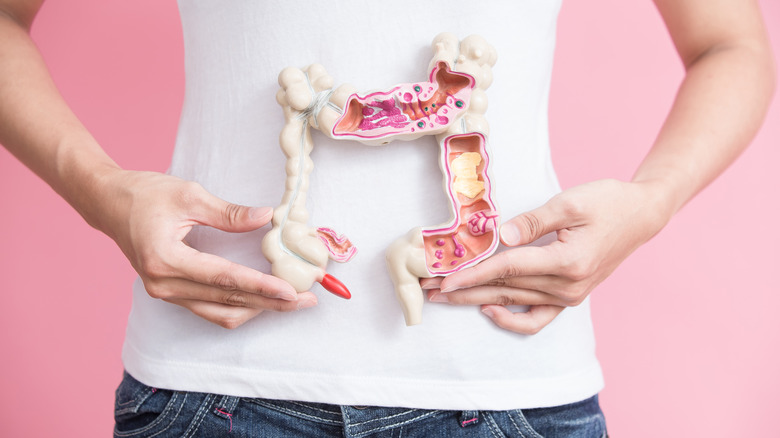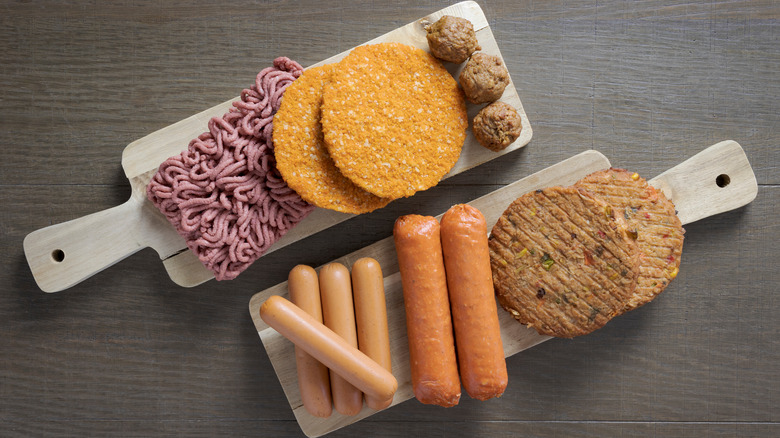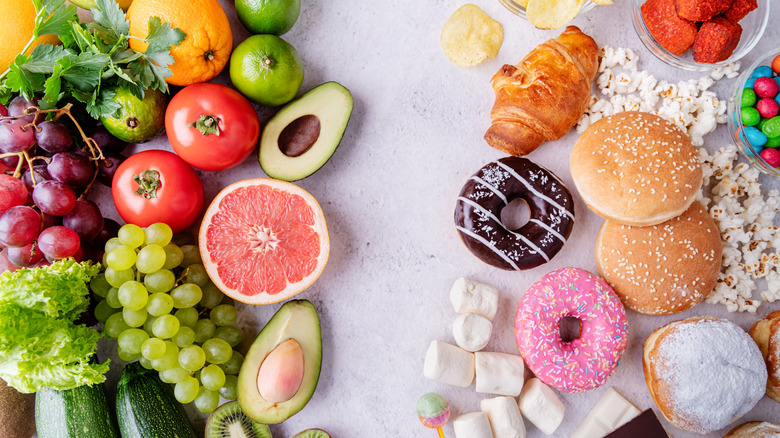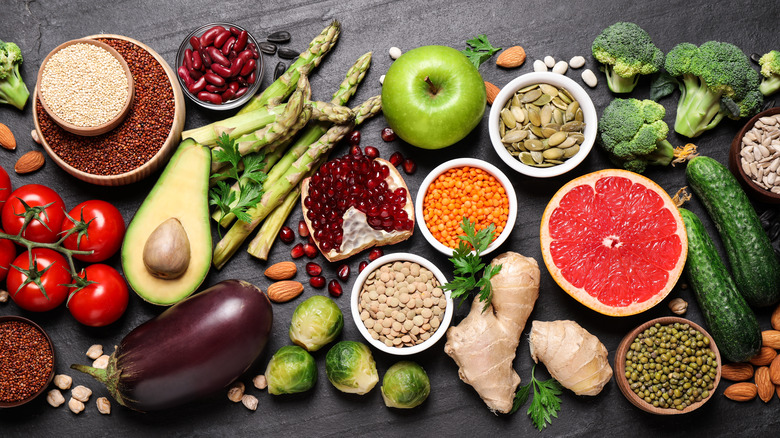10 Things You (Probably) Do Every Day That Affect Your Gut Health
These days, terms like "gut health" and "microbiome" have turned into buzzwords we hear all the time without really knowing a whole lot about them. Even medical professionals are only now starting to do in-depth research on how the gut works, and they are slowly discovering its infinite number of mysteries.
Your gut is somewhat of a miracle. It is incredibly complex and can affect your body (and your mental health) in various ways, according to a published study in the medical journal Gastroenterology & Hepatology. According to Healthline, your gut microbiome refers to the hundreds of bacteria species making their home in your gut. Their job is mainly to keep your body healthy, so it functions as it should. When those gut bugs become unbalanced, however, they can wreak havoc on your physical and mental health, and, most of the time, our daily habits are responsible for causing that imbalance.
If you're feeling overwhelmed at the prospect of having to keep your gut healthy on top of everything else you already have to do, you're not alone. The good news, though, is that you can easily change those everyday habits to serve your gut instead. Let's take a look at 10 things you probably do every day that could be ruining your gut health — and learn to fix it.
Drinking alcohol every day can affect your gut
Before you start frantically pouring all your wine down the drain, you should know that small amounts of alcohol are not detrimental to your gut health. Consuming excessive amounts, however, is a completely different story.
If you get nasty heartburn after a hearty drinking session, it's because the excessive amount of alcohol causes your stomach to produce more acid than it normally does, according to the NHS. Along with that, you may also notice that, if you suffer from existing digestive disorders, those conditions tend to flare up, too, after a night out drinking. So, what exactly classifies as binge drinking? We're glad you asked! According to the 2020-2025 Dietary Guidelines for Americans, women shouldn't consume more than one drink daily. For men, it's two. If you're indulging in more than that per day, your gut might not be too pleased.
A study published in the Gut Microbes journal explains that responsible alcohol consumption can prevent your gut bacteria from becoming completely unbalanced. Doing the opposite, however, could leave you with a condition known as dysbiosis, which can cause an array of uncomfortable conditions like diarrhea, constipation, acne, skin rashes, psoriasis, and even vaginal infections, to name a few (via WebMD). That doesn't mean that alcohol is all bad, though. A study found that drinking red wine — in moderation — can actually increase the good bacteria in the gut.
Sitting all day can be harmful to your digestive system
You've heard it before: Sitting all day is bad for your body, but it's also detrimental to your gut health. If you're constantly feeling bloated, your sedentary day-to-day lifestyle might be to blame. Clare Morrison, a general practitioner, spoke to HuffPost about the effect of sitting on the digestive system. She said that our bowels can't function as effectively when we sit. Staying in your seat all day means that the abdomen is compressed for hours on end, which can slow your digestion and, in turn, cause unwanted side effects like constipation, bloating, and heartburn.
Luckily, exercise can combat this bowel slump, so to speak. All you have to do to counter the side effects of sitting all day is ensure you move your body every day. One study shows that exercising regularly can actually alter your gut flora in a good way, making it more diverse. This eventually improves the Bacteroidetes-Firmicutes ratio, which can be greatly beneficial to people suffering from gastrointestinal disorders and obesity. Another study from the British Journal of Sports Medicine showed that engaging in about 30 to 40 minutes of exercise per day can significantly lower the health risks associated with spending most of the day on your butt. Edward R. Laskowski, MD, says to take it a step further and stand up about every half hour or get a standing desk to spend more time on your feet.
Smoking has an additional effect on gut health
We're all pretty aware of the fact that smoking is harmful to our bodies and can cause an array of health problems. However, it also appears to affect gut health. According to Johns Hopkins Medicine, digestive conditions, such as Crohn's disease, are more common among people who smoke — smokers also face a greater risk of developing colon cancer.
It's clear that smoking has an adverse impact on the gut. While more research has to be done to determine exactly how big of an impact, a small pilot study found that quitting cigarettes brings about notable changes in gut bacteria. Another study found that smoking itself changes the makeup of the gut microbiome and that once subjects stopped smoking, their gut bacteria became more diverse. The long-term effect of this change, however, is not yet clear.
Marcus Sublette, a cardiology fellow who served as lead author of the pilot study, told News24 that his team found a link between a diverse gut microbiome and a decreased heart rate as well as an increase in hemoglobin. All of these factors indicate that a diverse gut microbiome could potentially aid in better cardiovascular health, but more studies still need to be done. One thing's for sure, though: Your gut (and your body as a whole) is a lot happier without nicotine.
Using antibiotics regularly over the long term can harm the gut
There's no arguing that antibiotics have saved countless lives, but, recently, we've become more aware of their effect on gut health and the long-term implications of antibiotic use.
Antibiotics are effective because they attack and kill harmful bacteria. The downside? In doing so, antibiotics also kill beneficial bacteria. All the nasty side effects that come from antibiotic use are mostly from the change in your gut flora, according to Jasmine Omar, an internist with Henry Ford Health. This means that sudden bout of diarrhea or nausea is not a coincidence.
According to one study, the change in the diversity of your gut bacteria caused by antibiotics can actually leave you with long-term side effects. The study found that gut bacteria usually return to normal about four weeks after treatment stops, but often they don't return to the level they were before treatment — this leaves less of the good bacteria in your gut. Another study looked at the long-term effect of antibiotics on gut flora and found that, even after taking a short course of antibiotics, the impact is still visible in the intestinal microbiota up to two years later.
Therefore, it's best to only take antibiotics when they are your only option. This is because, as Omar explains, gut bacteria are responsible for maintaining a healthy immune system as well, so it's best not to compromise this unless you have a serious infection that needs urgent treatment.
Eating too much processed food can be harmful to gut health
Studies show that those who consume a diet of various healthy, whole foods boast a gut microbiome that's more diverse. The result will not be the same, however, if you eat a diverse range of processed foods. We all consume some form of processed food during the day, but you should be careful not to eat too much. Zoe, the developer of an app that tests your gut health, conducted research which found that highly processed foods and "bad" gut bacteria go hand-in-hand. Yikes.
This is mostly because processed foods contain tons of salt, sugar, and fats. Eating these foods also exposes your gut to added preservatives and chemicals you probably can't even pronounce. Unsurprisingly, all of this starves the good bacteria in your gut, allowing the "bad" bacteria to thrive.
We usually think of processed foods as meat products, such as bacon and sausage, but plant-based products, like baked beans and juices, are just as detrimental to your gut bacteria, according to Zoe. Their Predict 1 study showed the importance of including a diverse range of whole, plant-based meals in your diet, which, in turn, will allow the good gut bacteria to thrive. But don't exclude animal products just yet — the study also found that the same good gut microbes found in people who eat a plant-based diet were found in those who consume healthy animal products like yogurt and oily fish.
Indulging in sugary snacks can alter the makeup of gut bacteria
It's no secret that sugar isn't exactly good for our bodies, but it turns out that it can also alter the makeup of our gut bacteria, causing a slew of health problems like inflammatory bowel disease (IBD). A study found that the Western diet, characterized by high sugar consumption, appears to have a direct link to an increase in IBD cases. Another study found that people who meet the required vegetable intake lower their risk of developing IBD.
This does not mean, however, that you need to cut out all sugars. In fact, that is a pretty bad idea. Registered Dietician Brigitte Zeitlin told Well+Good that people should rather look to healthier sources for their sugar fix. Many vegetables, fruits, and grains contain sugars that are good for you. It's the added sugar you need to steer clear of since that is what usually causes inflammation. Gastroenterologist Will Bulsiewicz agrees with Zeitlin. He explained that the data from various studies suggest that the added sugars damage the microbiome. Bulsiewicz is not saying you should never indulge in that afternoon sugary snack, but that you should instead opt for a healthier option more often than not. He explained that fruit is the best option, because, along with being sweet, it also contains fiber, which is great for gut health. If you're really craving candy, opt for healthy snacks such as yogurt or fruit bars.
Neglecting to eat foods rich in prebiotics and probiotics can adversely affect the gut
We've already established that variety is key to eating for optimal gut health, but one reason this is so crucial is that your gut needs foods rich in prebiotics and probiotics.
According to Medical News Today, prebiotics are a fiber found in various fruits and vegetables that cannot be absorbed by our bodies. Instead, it serves as food for the bacteria in our gut, also known as probiotics. So, in short, probiotics are the bacteria that live in your gut, and prebiotics are what keep them alive. You can also ingest probiotics, which are found in fermented foods, such as yogurt, kefir, fermented cheese, and kombucha. Those who suffer from digestive conditions like irritable bowel syndrome (IBS) could benefit from taking probiotic supplements, a study suggests. It found that IBS patients' symptoms improved after they started taking probiotics, but more studies need to be done to determine just how much of an improvement and which probiotic strain is responsible.
If you struggle with constipation, eating more prebiotic-containing foods might help, according to WebMD. This is because prebiotics can help balance your gut bacteria so the good flora can thrive. This can also help reduce any inflammation you might experience in your gut. Even though more studies are needed, it appears at this point that a healthy gut also promotes a healthy immune system, so let that good gut bacteria grow!
Long-term stress can lead to gastrointestinal issues
Let's face it: Life is stressful, but long-term stress can wreak havoc on your gut. According to Harvard Health Publishing, stress can directly impact the gut and worsen symptoms like stomach pain. Interestingly enough, experiencing gastrointestinal issues can also lead to more stress. This is due to what scientists call the brain-gut axis. In fact, they even sometimes refer to the gut as the "second brain," per Johns Hopkins Medicine. Known as the enteric nervous system (ENS), it is responsible for controlling everything related to digestion: from swallowing to absorption and elimination, as Jay Pasricha, director of the Johns Hopkins Center for Neurogastroenterology, explained. He added that there's a line of communication between the gut and the brain (no wonder that stress has an effect!).
Delishia Pittman, a George Washington University counseling professor, told Livestrong that the body produces certain hormones when we go into stress mode. This affects our microbiome because these hormones eventually make their way into our gut and wreak havoc on the bacteria. The imbalance that follows is responsible for those pesky symptoms we associate with stress: nausea, constipation, and diarrhea. For some people, it might even lead to long-term issues like irritable bowel syndrome. Harvard Health Publishing adds that once stress has us in its grip, our bodies focus all their energy on the "threat," leaving little room for anything else, like digestion. In turn, digestion slows or stops completely, causing uncomfortable conditions like stomach pain and gastrointestinal upset.
Failing to get enough sleep can negatively impact the gut
Getting enough sleep is crucial — and it's something you can control to help keep your gut healthy. Much like stress, lack of sleep can affect your gut negatively and vice versa. Ryan Barish, a functional lifestyle medicine practitioner at Henry Ford Health, says it's important to create a regular routine for our bodies. Just how our bodies have a circadian rhythm, our gut appears to have one of its own — this is why lack of sleep could impact gut bacteria negatively, according to one study.
Another study tested this theory and found that those who lacked adequate sleep for two continuous nights suffered changes to their gut bacteria as opposed to those who got a sufficient amount of sleep. These changes, although subtle, allow certain bacteria to thrive — specifically the kind linked to type 2 diabetes, weight gain, and obesity.
Lack of sleep can also bring on sugar cravings the next day — and we've already established this is not good. Published research from Zoe indicates that getting enough sleep actually helps the body to control blood sugar much better after breakfast. This means you'll be less likely to crave all the wrong foods by mid-morning, in turn, leading to better gut health. There's no doubt that sleep is important in general, but now that we're beginning to understand its impact on our gut, we're realizing it's non-negotiable.
Not drinking enough fluids can lead to constipation
Suffering from chronic constipation? It's probably your gut trying to tell you it's thirsty! According to Healthline, water is imperative to keep your gut bacteria balanced. Failing to drink enough water tends to manifest as constipation, which can become chronic, according to WebMD. Your colon needs water to form your stool, so if your body doesn't have sufficient amounts, the colon absorbs it from food waste. This results in dry, hard stools.
The fix is fairly easy: Drink more water. And, if you're desperate to get things moving again, try mineral water. Because of its sodium and magnesium content, it aids in bowel movement, helping to ease constipation a little faster, according to one study. To keep your gut happy, try to consume enough fluids throughout the day. According to WebMD, eight cups should do it, but it's also important to pay attention to your body and drink more if needed. And, so you know, it doesn't just have to be water. You can opt for drinks like herbal teas and vegetable juices. Fruit juice might seem like a great idea, but, unfortunately, it contains a lot of sugar. If you're constipated, try to also steer clear of alcohol for a while — it dehydrates your body and can, therefore, worsen the condition.
Bottom line: As long as you keep your body hydrated, your gut will be happy — as will your visits to the bathroom. So, drink up!











